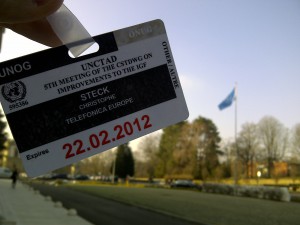 Christoph Steck /@christophsteck
Christoph Steck /@christophsteck
Director of Public Policy and Internet at Telefónica
After more than a year’s work and five three-day meetings at the UN premises in Geneva the CSTD Working Group on Improvements to the IGF has published its final report. I have been a member of this workgroup as a representative for the business community and my personal take-away is: Against all odds and criticisms this report shows that multi-stakeholder processes do work well and can create good results – but they need open-mindness from all parties, mutual confidence and most importantly: some time.
The Working Group was set up by the UN to work on recommendations to improve the IGF, when its mandate was prolonged in 2010 for another five years. As the IGF is according to the principles agreed at the WSIS in Tunis in 2005 based on the principle of multi-stakeholder participation and governance, it was straightforward to also establish the Working Group according to the multi-stakeholder principle: Next to five members from the Business community there have been the same number of representatives also from the Technical community and Civil Society. The other members of the Working Group consisted of representatives from over 20 states and governments as well as some international organisations (e.g. ITU, WIPO).
All these members have been participating on “equal footing”, which means that we had the same rights and duties. Sounds normal and sensible? Well, think again: in international policy-making this is the exception, because generally only governments and states have the right to vote and decide. Most international policy-making bodies have only mechanisms and processes that allow for non-governmental stakeholders to give their views and advice, but final decisions still remain with member states.
Multi-stakeholder policy making is therefore still the exception, not the rule. Only in the Internet-related bodies (e.g. ICANN, IGF) this innovative governance is established since the 1990s and has since then been a cornerstone and solid basis for the impressive growth and innovation of the Internet across the whole world.
It was therefore not surprisingly that at the beginning of the Working Group in early 2011 the debates between members of the working group were quite heated and many times misunderstandings prevailed on all sides. I believe the main problem was that only two meetings could be held before the initial deadline for the report in April 2011. That proved to be too ambitious and it was in the end impossible to achieve unanimity on a final report and recommendations everyone could sign up to. Why? Well, remember the basis for successful multi-stakeholder work: Confidence and time.
We honestly did not have too much of that in the room.
The UN ECOSOC therefore wisely in May 2011 prolonged the mandate of the Working Group and thereby gave us the chance to agree finally this year on many recommendations (in total more than 50), which can be broadly summarized under these high-level items:
- Develop more tangible outputs of the IGF and improve its visibility
- Improve the overall preparatory process of the IGF
- Improve the structure and working methods of the MAG
- Strengthen the IGF Secretariat
- Encourage increased voluntary financial contributions
- Enhance accountability and transparency of the IGF
- Better acknowledge the host country’s support and the in-kind support from other countries, organizations and the United Nations
- Expand and diversify participation and improve measures for broader participation like remote participation
- Improve the online visibility and accessibility of the IGF
- Enhance all stakeholders’ understanding of the IGF and Internet governance Issues
- Support enhanced communication by the IGF and empower the MAG and the IGF Secretariat to do consistent outreach
As the many international conferences by International organisations in the last time has shown, Internet Governance has become over the last few years an area of global policy-making and geopolitical struggles. I think it is remarkable that given these political pressures and tensions, the Working Group had been able to agree on so many important proposals for improvements between all stakeholders and states.
It should not be forgotten that the text of the final report was agreed in diplomatic manner word-by-word, line-by-line unanimously by all working group members. I believe it takes it strengths exactly from this fact: These improvements are what this quite diverse group could agree on, what least developed, developing and developed countries agree to, what is in accordance with business´ views but also is supported by civil society.
It is in a nutshell the global consensus regarding the evolution of the IGF – and therefore also for sure the best basis for developing its future!
The final report is due to be discussed at the 15th Session of the UN Commission on Science and Technology for Development (CSTD) on 22nd May and will go as an input from CSTD through UN ECOSOC to the UN General Assembly at the end of 2012.
I hope it will find many considerate and careful readers and will help developing the IGF throughout the next years, making it even more inclusive and fundamental as THE global platform to discuss the Governance and policy challenges of the Internet!
Christoph Steck, Chief Regulatory Officer, Telefónica Europe.









